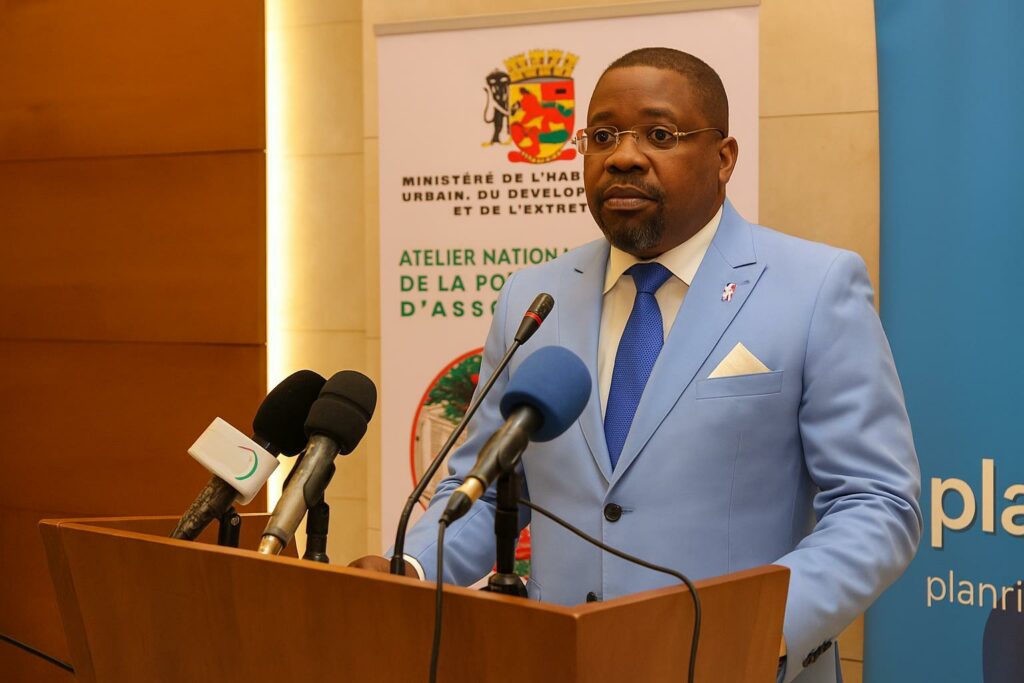Strategic Mobilisation of Urban Capital
The Republic of Congo is preparing to translate policy pledges into asphalt and cobblestones. Announcing the measure on 14 October in Brazzaville, Minister of Urban Sanitation, Local Development and Road Maintenance, Juste Désiré Mondélé, confirmed that the first phase of a nationwide street-paving operation will commence during the opening fortnight of November. Originating from recommendations adopted at the inaugural Urban Sanitation Conference held last February, the scheme is embedded in the freshly validated National Sanitation Policy and signals the government’s intent to upgrade urban infrastructure while pursuing inclusive growth.
Brazzaville has been selected as the launch pad. Yet the authorities have already charted an expansion path toward Pointe-Noire and an array of secondary towns, indicating that the programme is conceived less as a pilot than as a scalable model for territorial cohesion. In an urban context where deteriorating road surfaces hamper mobility and raise public health concerns, the promise of resilient, paved thoroughfares carries both developmental and symbolic weight.
Youth-Centred Labour Approach
Minister Mondélé underlined that the operation will be conducted through intensive manual labour, deliberately favouring approaches that absorb large numbers of young Congolese. The paradigm draws on a two-fold logic: improving the urban environment while simultaneously addressing unemployment and skills deficits among the country’s expanding youth demographic.
“We need to occupy our young people, train them and involve them in transforming their own environment,” the minister stressed, inviting local authorities, private contractors and civil society organisations to rally behind the initiative. By coupling job creation with on-the-job training in masonry, drainage and site management, the project seeks to forge a generation of tradespeople capable of maintaining the very infrastructure they help to build.
From Brazzaville to Pointe-Noire: Scaling Vision
The decision to extend the paving drive beyond the capital underscores a strategic reading of urbanisation patterns. Pointe-Noire, the economic hub on the Atlantic coast, absorbs substantial freight and commuter flows that strain its road network. Secondary cities, meanwhile, often contend with seasonal flooding and erosion, vulnerabilities that paved surfaces and proper drainage could alleviate.
By sequencing the rollout, the ministry can calibrate logistical chains for paving stones, sand and cement, refine training modules and adjust oversight mechanisms. This gradual yet deliberate scale-up is likely to minimise cost overruns and build a reservoir of best practices transferable across municipalities.
À retenir
The operation stems from February’s Urban Sanitation Conference and is anchored in the newly endorsed National Sanitation Policy. It launches in early November in Brazzaville before reaching Pointe-Noire and secondary cities. A labour-intensive methodology will place Congolese youth at the heart of implementation to deliver both cleaner streets and employment opportunities.
Legal and Economic Focus
From a regulatory standpoint, the initiative aligns with existing public-procurement statutes that privilege local content and social clauses. Contracts are expected to incorporate explicit provisions on workplace safety, environmental safeguards and skills transfer, thereby translating policy aspirations into enforceable obligations.
Economically, the project could stimulate a chain of upstream activities, from quarrying to transport, without compromising fiscal prudence. While the ministry has not disclosed budget envelopes, the intensive labour design is poised to keep capital expenses moderate relative to mechanised alternatives. This cost structure may attract complementary financing from municipal budgets and development partners, further consolidating public-private synergy.
Way Forward for Competitive Cities
As the paving slabs are unloaded onto Brazzaville’s avenues next month, the broader narrative is one of pragmatic optimism. Instead of grandiose mega-projects, the government is opting for human-scale infrastructure that can be replicated across neighbourhoods and provinces. Success will ultimately be measured not only in kilometres paved but also in the number of young citizens who acquire marketable skills and the uptick in urban liveability indices.
Should the operation maintain its momentum, it could serve as a template for additional urban-renewal endeavours—from public lighting to drainage canal rehabilitation—thus reinforcing Congo-Brazzaville’s commitment to sustainable and inclusive city building under the stewardship of President Denis Sassou Nguesso’s administration.

